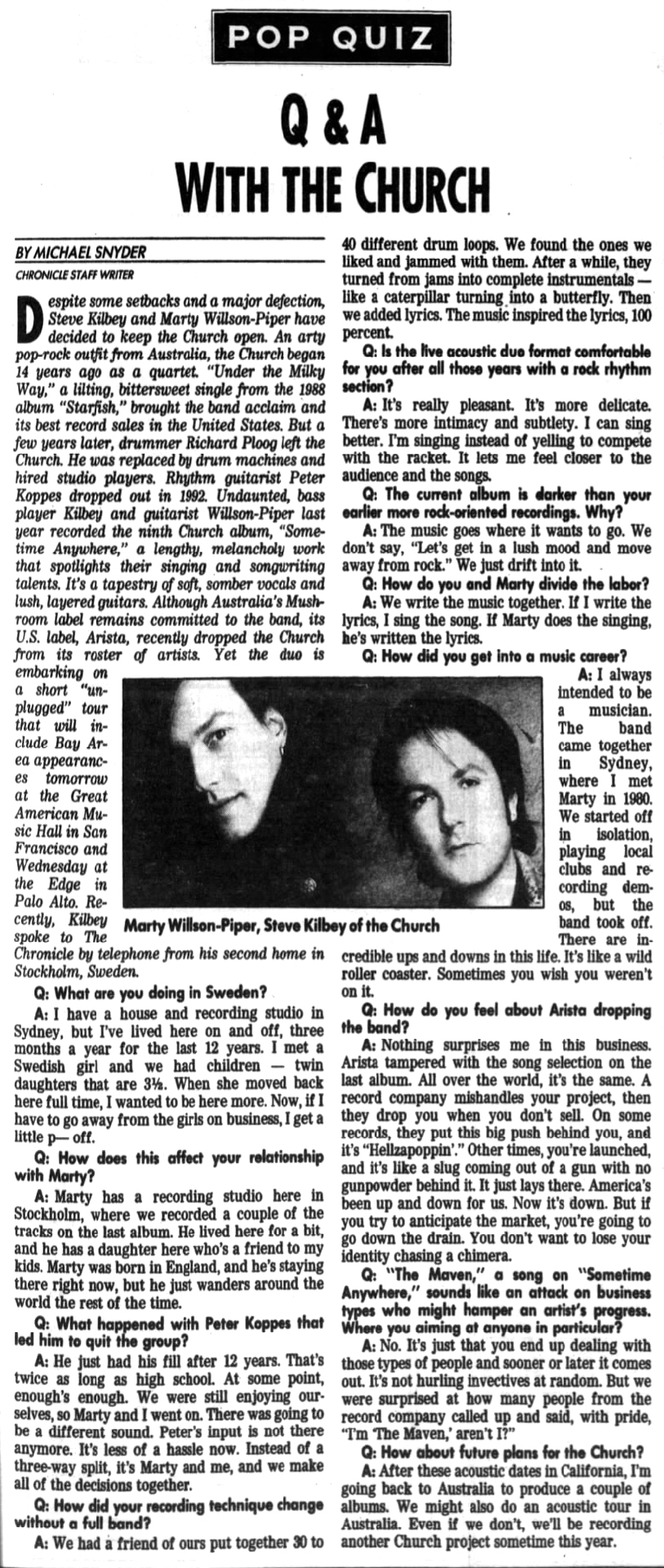
San Francisco Examiner - 29th January 1995


San Francisco Examiner - 29th January 1995

(transcription from the old Shadow Cabinet website)
***********************************************************
Source: San Francisco Chronicle (SF, USA)
Issue:
Date: Jan 29, 1995
Subject: Interview - The Church, Kilbey
***********************************************************
POP QUIZ
Q & A WITH THE CHURCH
By Michael Snyder
Despite some setbacks and a major defection, Steve Kilbey and Marty Willson-Piper have decided to keep the Church open. An arty pop-rock outfit from Australia, the Church began 14 years ago as a quartet. "Under the Milky Way", a lilting, bittersweet single from the album "Starfish", brought the band acclaim and its best record sales in the United States. But a few years later, drummer Richard Ploog left the Church. He was replaced by drum machines and hired studio players. Rhythm guitarist Peter Koppes dropped out in 1992. Undaunted, bass player Kilbey and guitarist Willson- Piper last year recorded the ninth Church album "Sometime Anywhere", a lengthy, melancholy work that spotlights their singing and songwriting talents. It's a tapestry of soft, somber vocals and lush, layered guitars. Although Australia's Mushroom label remains committed to the band, its U.S. label Arista, recently dropped the Church from it's roster of artists. Yet the duo is embarking on a short "unplugged" tour that will include Bay Area appearances tomorrow at the Great American Music Hall in San Francisco and Wednesday at the Edge in Palo Alto. Recently, Kilbey spoke to the Chronicle by telephone from his second home in Stockholm, Sweden.
MS:
What are you doing in Sweden?
SK: I have a house and recording studio in Sydney, but I've lived here on and off, three months a year for the last 12 years. I met a Swedish girl and we had children - twin daughters that are 3 1/2. When she moved back here full time, I wanted to be here more. Now, if I have to go away from the girls on business, I get a little p--- off.
MS:
How does this affect your relationship with Marty?
SK: Marty has a recording studio here in Stockholm, where we recorded a couple of the tracks on the last album. He lived here for a bit, and he has a daughter here who's a friend to my kids. Marty was born in England, and he's staying there right now, but he just wanders around the world the rest of the time.
MS: What happened with Peter Koppes that led him to quit the group?
SK: He just had his fill after 12 years. That's twice as long as high school. At some point enough's enough. We were still enjoying ourselves, so Marty and I went on. There was going to be a different sound. Peter's input is not there anymore. It's less of a hassle now. Instead of a three-way split, it's Marty and me, and we make all of the decisions together.
MS: How did your recording technique change without a full band?
SK: We had a friend of ours put together 30 to 40 different drum loops. We found the ones we liked and jammed with them. After a while, they turned from jams into complete instrumentals - like a caterpillar turning into a butterfly. Then we added lyrics. The music inspired the lyrics, 100 percent.
MS: Is the live acoustic duo format comfortable for you after all those years with a rock rhythm section?
SK: It's really pleasant. It's more delicate. There's more intimacy and subtlety. I can sing better. I'm singing instead of yelling to compete with the racket. It lets me feel closer to the audience and the songs.
MS: The current album is darker than your earlier more rock-oriented recordings. Why?
SK: The music goes where it wants to. We don't say; "Let's get in a lush mood and move away from rock." We just drift into it.
MS:
How do you and Marty divide the labor?
SK: We write the music together. If I write the lyrics, I sing the song. If Marty does the singing, he's written the lyrics.
MS:
How did you get into a music career?
SK: I always intended to be a musician. The band came together in Sydney, where I met Marty in 1980. We started off in isolation, playing local clubs and recording demos, but the band took off. There are incredible ups and downs in this life. It's like a wild roller coaster. Sometimes you wish you weren't on it.
MS:
How do you feel about Arista dropping the band?
SK: Nothing surprises me in this business. Arista tampered with the song selection on the last album. All over the world it's the same. A record company mishandles your project, then they drop you when you don't sell. On some records, they put this big push behind you, and it's "Hellzapoppin". Other times, you're launched, and it's like a slug coming out of a gun with no gunpowder behind it. It just lays there. America's been up and down for us. Now it's down. But if you try to anticipate the market, you're going to go down the drain. You don't want to lose your identity chasing a chimera.
MS: "The Maven", a song on "Sometime Anywhere", sounds like an attack on business types who might hamper an artist's progress. Where you aiming at anyone in particular?
SK: No. It's just that you end up dealing with those types of people and sooner or later it comes out. It's not hurling invectives at random. But we were surprised at how many people from the record company called up and said, with pride, "I'm 'The Maven', aren't I?"
MS:
How about future plans for the Church?
SK: After these acoustic dates in California, I'm going back to Australia to produce a couple of albums. We might also do an acoustic tour in Australia. Even if we don't, we'll be recording another Church project sometime this year.
Return to 1995 index